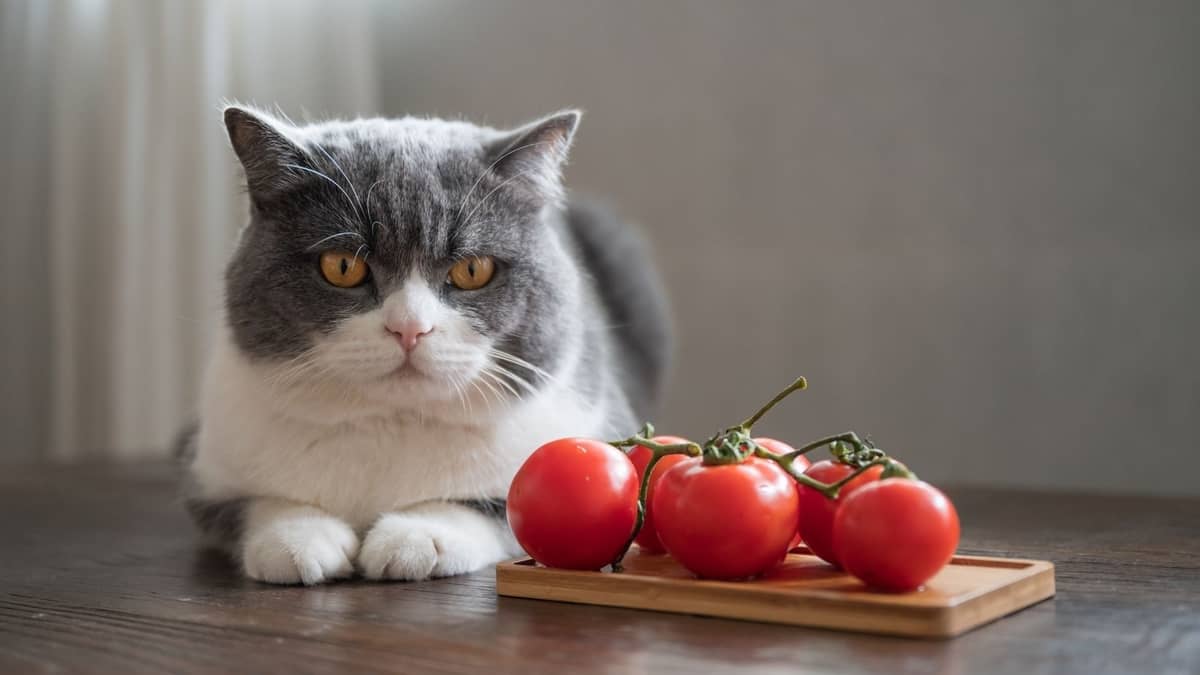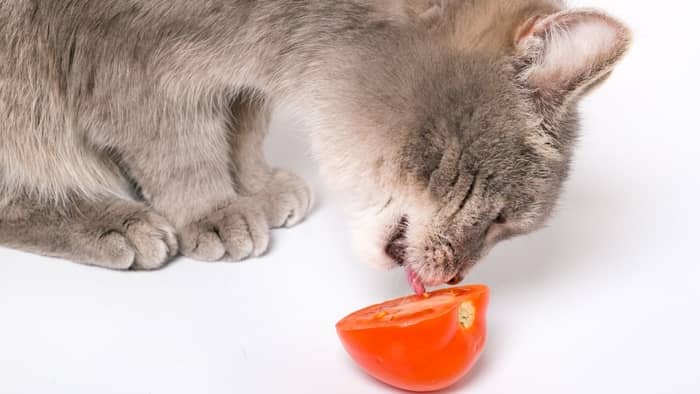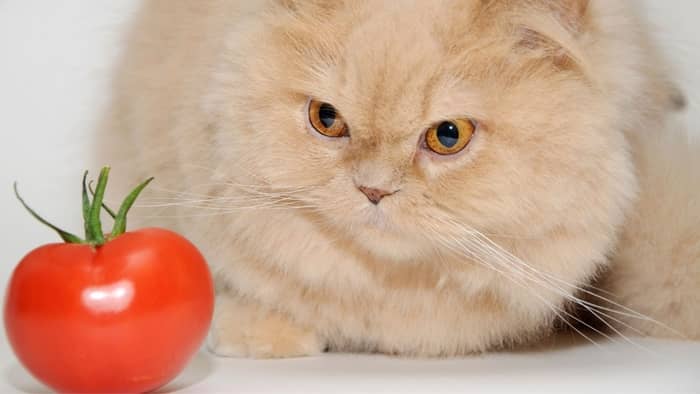If you’re including greens in your cat’s diet or have a tomato plant in your yard that they can access, it’s important to know if cats can eat tomatoes.
In addition to knowing whether your cat can safely consume tomatoes, you’ll want to make sure they’re eating them in moderation.
IMPORTANT: At stuffaboutcats.com, we regularly consult with licensed veterinarians and other industry experts. However, the information found on stuffaboutcats.com should not be viewed as veterinary advice. We do our best to help you better understand your cats, but the information on this blog is not a substitute for veterinary guidance.
After researching whether cats can eat tomatoes for the safety of my own cats, I decided to answer this lingering question. I also equip you with some essential knowledge to help you navigate tomato plant poisoning in cats.
Can Cats Eat Tomatoes?
Cats are omnivores, which means they can eat fish, meat, plants, and other animals. They will taste just about anything they find, so make sure they don’t have access to things that can harm them.
Typically, cats can safely consume tomatoes, but yours might develop problems.
The answer to this question isn’t a simple yes or no. Many factors play a role, including your cat’s digestive system and whether the tomatoes are cooked or raw. Which part of the tomato your cat consumes and existing health complications at the moment of consumption also have an influence.
Can My Cat Eat Tomatoes?
Tomatoes are acidic and can pose a toxic danger to your cat. One way to find out whether tomatoes will negatively affect your cat is to ask your veterinarian to perform an allergy test.
Another way to test your cat’s sensitivity to tomatoes is to try giving them a small amount of tomato juice. This is a low-risk way to test if your cat can eat tomatoes. After feeding it to them, you can watch out for signs of tomato plant poisoning.
If you do this test or find evidence that your cat ate tomatoes, you need to keep an eye out for these tomato poisoning symptoms:
- Your cat may appear sickly, weak, or drowsy
- Your cat may develop a fever
- Your cat may vomit a small amount of tomato juice
- Your cat may produce an excessive amount of saliva
- Your cat’s pupils may enlarge
When you notice any of these symptoms, you must immediately take them to the vet.
Cat Food That Contains Tomatoes: Are They Safe?
You might come across dry or wet cat food that contains tomatoes. Many cat food manufacturers include tomatoes in their recipes because this fruit is rich in fiber, potassium, and vitamin C.
Dry cat food may contain tomato flavoring, while it may be used in wet cat food to keep it moist. How manufacturers use tomatoes in their cat food will determine whether it’s safe for your fuzzball to consume.
If your cat struggles to digest tomato, but you really want them to enjoy the flavor, you should stick to dry cat food that only uses it as a flavoring.
Tomato Plant Poisoning
If your cat consumes too many tomatoes, it can get tomato plant poisoning. While it’s scary to witness, your cat won’t necessarily die from it.
Diagnosis
If you suspect your cat has tomato plant poisoning, you need to take them to the vet!
There, they’ll examine your cat, run a blood test, and possibly collect a urine sample to diagnose your cat’s condition.
Treatment
Based on their symptoms, the vet will treat your cat’s tomato plant poisoning.
If your cat ate a lot of tomatoes, your vet will likely induce vomiting to rid their body of the toxins. Any remaining toxins might be neutralized with activated charcoal.
Treatments for dehydration and breathing difficulties are less invasive.
Recovery
Typically, cats don’t take long to recover from tomato plant poisoning. Your vet will guide you on the best way to help your pet heal.
The recovery process will depend on how severe your cat’s symptoms were. You can expect plenty of water and some medication on the list. Ensuring that your cat eats, gets sufficient sleep in a snuggly spot, and stays away from tomatoes is also essential.
Your vet might even ask you to fence off or remove any tomato plants that your cat can access.
Conclusion
If you really want your cat to experience the taste of this juicy red fruit, you should consider only using it as a treat once you’ve established that your cat can eat tomatoes. I believe including it in their daily diet is unnecessary and simply not worth the risk.
I hope this article answered whether cats can eat tomatoes and equipped you with the knowledge to spot an allergic reaction if it develops after your cat’s tomato consumption.
Feel free to comment any additional question you have for other readers or me to answer or share an experience you have with your cat eating tomatoes!
Read more about The Ultimate Safe Nutrition Guide: Can Cats Eat Mint Ice Cream?
FAQs
Why would a cat eat tomatoes?
Your cat might want to eat a tomato because they need a nutrient that the cat food you're giving them isn't providing. It's natural for an animal's body to crave whatever it needs.
Another reason your cat might like eating tomatoes is simply because of how they taste and smell. When they stroll past one, they may just be curious.
How much tomato is toxic to cats?
It's difficult to determine precisely how much tomato your cat can safely consume. While two teaspoons a day is considered safe, your cat can have an adverse reaction to even less.
The various tomato plant parts also have different effects n cats. Its greenery can cause lethargy, nausea, and vomiting even when your cat only consumes tiny amounts.
Why does my cat bite tomatoes?
Some cats like the juice of tomatoes. If your cat is biting one, it may be in an attempt to get to its inside.
Your cat might also bite a tomato it sees because of an instinctual urge.
Is ketchup okay for cats?
Ketchup is mainly made from ripe tomatoes. These are labeled as non-toxic to cats.
Still, you should avoid feeding your cat ketchup since it contains a lot of salt that can cause digestive issues, seizures, and even sodium ion poisoning.


